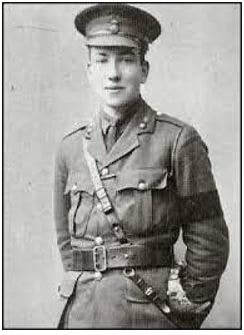Two Fusiliers and Two Poets
 Robert Graves was born in Wimbledon in 1895, the third child of ten. His father was an Irish poet and his mother was the great-niece of a famous German historian. Graves learned to box because his half-German ancestry made him the target of bullies.
Robert Graves was born in Wimbledon in 1895, the third child of ten. His father was an Irish poet and his mother was the great-niece of a famous German historian. Graves learned to box because his half-German ancestry made him the target of bullies. Graves published his first poems in 1911, when he was a student at The Charterhouse School. One of the young masters there was George Mallory, who introduced Graves to the works of George Bernard Shaw, Rupert Brooke, and John Edward Masefield, and took him climbing. Mallory was later to die on the 1924 Everest expedition.
In 1914, Graves was supposed to go to St John’s College, Oxford. Instead, he enlisted in the army joining the Royal Welch Fusiliers. He was posted to France in May 1915, and fought in the Battle of Loos in September that year. Two months later, he met the poet Siegfried Sassoon, a fellow-officer in the Royal Welch Fusiliers. “Two Fusiliers”, is a celebration of that friendship.
In July of 1916, Graves was wounded by a shell at High Wood, in the Somme. His colonel believed that Graves' injuries would result in his death, and wrote a condolence letter to Graves’s parents. The Times reported that Graves had died of his wounds in their August 4, 1916 edition. This “death” and “rebirth”, which occurred close to his 21st birthday, had a profound effect on Graves’s life and writing.
Graves' bestselling war memoir, Good-bye to All That, was published in 1929 and caused a rift between him and Sassoon and ultimately between himself and his country. He moved to Deià in Majorca, where he lived until his death in 1985 with the exception of two periods, during the Spanish Civil War and the Second World War, when he was evacuated.
Graves is not only known as a poet and mythologist, but as a novelist. His I, Claudius books were turned into a miniseries for PBS.
Two Fusiliers
BY ROBERT GRAVES And have we done with War at last?
Well, we've been lucky devils both,
And there's no need of pledge or oath
To bind our lovely friendship fast,
By firmer stuff
Close bound enough.
By wire and wood and stake we're bound,
By Fricourt and by Festubert,
By whipping rain, by the sun's glare,
By all the misery and loud sound,
By a Spring day,
By Picard clay.
Show me the two so closely bound
As we, by the wet bond of blood,
By friendship blossoming from mud,
By Death: we faced him, and we found
Beauty in Death,
In dead men, breath. Jennifer Bohnhoff's World War I historical novel A Blaze of Poppies will be published in October 2021 and is available for preorder on Amazon.
Published on September 21, 2021 23:00
No comments have been added yet.



